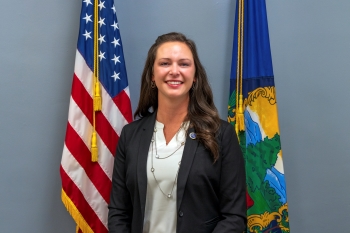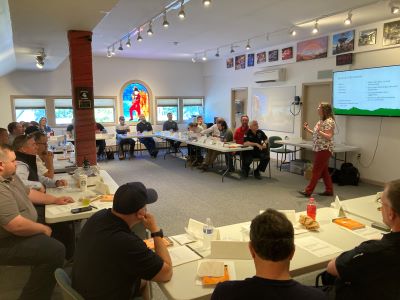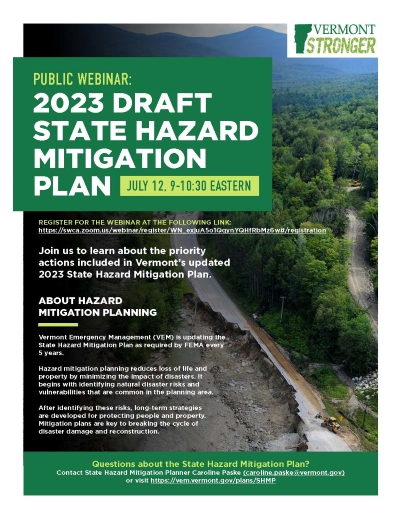
June, 2023
Volume 17 Issue 6
**Best viewed on a computer browser or horizontally if you are on a smart phone**
Director Erica Bornemann Leaving Vermont Emergency Management
 Vermont Emergency Management Director Erica Bornemann will be leaving VEM and state government as of June 2nd, 2023.
Vermont Emergency Management Director Erica Bornemann will be leaving VEM and state government as of June 2nd, 2023.
Director Bornemann started at Vermont Emergency Management as an intern in 2007 and was hired as a full-time planner in 2008. In her time at VEM she has served as Planning Chief, Chief of Staff, and Director since 2017. She served a term as President of the National Emergency Management Association in 2022.
In her 16 years at VEM she has been an active participant in 27 federally declared disasters, including Tropical Storm Irene in 2011, and as Director during the COVID pandemic.
Erica was coordinator of the first Vermont Emergency Preparedness Conference, and acted as Accreditation Manager during the first successful accreditation of Vermont’s emergency management program by the Emergency Management Accreditation Program (EMAP). Later, she became a member of the EMAP Commission, reviewing and approving other emergency management programs.
Director Bornemann led the coordination of emergency response resources and staffing from all state agencies, federal organizations like the National Guard and Federal Emergency Management Agency, and private/non-profit partners.
Erica has given countless hours to help ensure the safety of Vermonters. She is moving on to a job in the private sector, one that will give her more time with her husband and two sons.
VEM Deputy Director Eric Forand will serve as Interim/Acting Director after Erica’s departure. Eric joined VEM in September of 2017 and was named Deputy Director in July of 2022. He manages day to day operations at VEM and works with communities and partners on VEM issues and initiatives.
VEM Staff Changes
Max Kennedy has been named Planning Section Chief at Vermont Emergency Management. Max joined VEM in 2017. Prior to coming to VEM, Max worked for seven years in emergency preparedness for the Vermont Department of Health. Max is a graduate of the University of Vermont and is currently serving in the Vermont Army National Guard.
Max replaces Liz Rowell who is leaving state service after two years as a Planner at VEM, and previous service at the Vermont Department of Health as an Emergency Preparedness Specialist during the COVID pandemic.
Harry Schoppmann, former Northeast Regional Coordinator, has now moved over to the Northwest Region previously served by Max. The Northeastern Regional Coordinator position is now vacant, and applications are being accepted until June 12th. https://careers.vermont.gov/job/Home-Based-Vermont-Emergency-Management-Regional-Coordinator-VT/1030641400/
Hot Weather on the Way - What Towns Can do for Residents
The week of May 29 presented the first upper-80s/low 90s temperatures of the season, and it won’t be the last.
This summer will likely feature temperatures and humidity at times, which is concerning to emergency responders due to the chances for heat-related illnesses that often result. It’s important during warm weather to stay hydrated; check on vulnerable neighbors, family, and friends; and other steps to stay safe.
More tips and an interactive map showing places the public can stay cool can be found at HealthVermont.gov/hot-weather
Important Information From the Vermont Department of Health:
Populations Most Affected
Individuals who are generally at higher risk for heat-related health impacts include: older adults; young children; outdoor workers and hobbyists; people who are pregnant; people who are overweight, have a chronic medical condition, mental illness, or disability; people using recreational drugs or alcohol; and people using certain prescription medications. Risk is further elevated for people that are unhoused but cannot access cooling facilities and for people that are housed but do not have air conditioning, especially if also living alone - dehydration and prolonged exposure to hot living conditions are major concerns for these populations.
Symptoms and first aid
Muscle cramps, heavy sweating, nausea, headache or light-headedness may all indicate a heat-related illness. Most heat-related illnesses can be treated with fluids and by resting in a cooler place. If symptoms persist or get worse, or someone you are with seems confused or loses consciousness, dial 9-1-1 and get immediate medical help. Learn more about symptoms and first aid.
Prevention guidance for communities
- Use Front Porch Forum or social media to raise awareness – examples are provided in our Hot Weather Media Toolkit.
- Be familiar with symptoms of heat-related illnesses and first aid responses.
- Offer safe and fun ways to stay cool, such as free or extended access to beaches and pools, providing hoses or misters, and offering free cold beverages.
- Consider opening a cooling center, which could be any air-conditioned, publicly accessible location (for example, a library or community center)
- Mobilize local care networks to check in on people at high risk for heat-related illnesses.
- For outdoor work, recreational activities, or other local events, ensure that organizes are prepared with water, cooling strategies, and event modification or cancellation plans.
- Hot weather can affect anyone – be aware of your own symptoms and look out for others
- Find detailed hot weather planning guidance and a planning template.
Find more information and resources:
- Heat safety tips in 12 languages (available online or as printable pdfs). Safety tips are available in Arabic, Burmese, Chinese, English, French, Karen, Kirundi, Nepali, Somali, Spanish, Swahili, and Vietnamese.
- Vermont Cooling Sites online map of indoor and outdoor locations where the public can go to cool off (also available as printable pdfs). If you are aware of other cooling locations we should add to the map, please email me or submit them through the online cooling site form.
- Hot Weather Media Toolkit – provides key messages about risks and prevention strategies and example front porch forum and social media messages. Please feel free to modify and use these messages in your communications.
- Local hot weather preparedness guidance and planning template – these are intended for use by emergency management directors and their local partners to aid in developing a heat response annex to their Local Emergency Management Plan. The Vermont Department of Health has been awarding small grants to Regional Planning Commissions to provide municipal partners with planning technical assistance, and still have some funds available to support additional grants.
National Weather Service Hazardous Weather Outlook
Questions? Call the Vermont Department of Health/Environmental Health at 802-863-7220, extension 0, or contact ClimateHealth@vermont.gov.
Shelburne Rail Tabletop Exercise

Nearly 40 representatives of state and local emergency responders, non-profit organizations, schools, and others took part in a tabletop exercise in Shelburne on May 31st. The scenario included an overturned and damaged rail car with hazardous materials on board.
The group discussed their agencies’ plans and how those plans allow for multi-agency coordination.
Towns that wish to explore training and exercise opportunities should contact their Vermont Emergency Management Regional Coordinator:
Northwest, Harry.Schoppmann@vermont.gov
South, Taiga.Christie@vermont.gov
Northeast, Engagement Section Chief Emily.Harris@vermont.gov
Introductory Unoccupied Aircraft Systems Training
The University of Vermont is hosting FEMA's introductory Unoccupied Aircraft Systems (UAS or drones) courses in the summer of 2023. There are two identical sessions (June 13-14 & June 27-28), each consisting of two days of training. The sessions are identical, and thus, participants should attend only one session for both days.
These courses are offered at no charge to first responders and those who participate in emergency management or disaster response functions. Travel, lodging, and meals are all covered. The courses assume no prior UAS experience. Participants should feel comfortable using computers and tablets. Space is limited.
AWR-422: UAS Flight Operations for Emergency Response (Day 1) is a 1-day, in-person course that will prepare first responders with technical resources, knowledge, and experience to deploy UAS for a variety of emergency response scenarios. Content will cover rules and regulations, mission planning, airspace coordination, platform and sensor selection, risk assessment and mitigation, flight operations, data collection, and metadata retention.
PER-407: UAS Data Analytics for Emergency Response (Day 2) is a 1-day, in-person, instructor-led course on how to effectively organize, generate, analyze, and rapidly disseminate geospatial data from UAS data. Course content will cover how to transform UAS imagery, video, and other data into products that can be used to support decision-making, damage assessment, and other mission-critical tasks for emergency response.
Please fill out this form if you are interested - https://forms.office.com/r/nT0h1YFQKA
If you have any questions, please contact University of Vermont Emergency Management Director, John Marcus: jmarcus@uvm.edu or (802) 656-4363

Training
June 2023
PER- 344 Social Media Tools and Techniques- Virtual
June 6, 2023- June 7, 2023, 1:00 – 5:00 p.m. each day
Must attend both sessions to receive credit
Registration required via University of Hawaii: https://ndptc.hawaii.edu/training/delivery/3265/
Code 03216
PER- 343 Social Media Engagement Strategies- Virtual
June 13, 2023- June 14, 2023, 1:00 – 5:00 p.m. each day
Must attend both sessions to receive credit
Registration required via University of Hawaii: https://ndptc.hawaii.edu/training/delivery/3266/
Code 81439
July 2023
ICS 300- Intermediate ICS for Expanding Incidents – In Person
Milton Fire Department- Milton, VT
July 18-20, 2023, 8:00 a.m. – 4:30 p.m. each day
Prerequisite: ICS-100 and ICS- 200
Registration required via State Learning Management System: https://vermont.csod.com/
August 2023
SEOC Orientation- In Person
DPS – Headquarters- Waterbury
August 15, 2023, 1:00 – 3:30 p.m.
Prerequisite: IS-100
Must be on the SEOC Roster
Registration required via State Learning Management System: https://vermont.csod.com/
September 2023
G0191 – ICS/EOC Interface – In Person
Grand Isle Sheriff’s Department, Grand Isle, VT
September 7, 2023, 8:00 a.m. - 4:30 p.m.
Prerequisite: IS-200, IS-700, and IS-800
Registration required via the State Learning Management System: https://vermont.csod.com/
Vermont Emergency Preparedness Conference
Burke Mountain Hotel & Conference Center
September 20-21, 2023
Registration details to come
October 2023
L0146 Homeland Security Exercise & Evaluation Program (HSEEP) - In Person
Londonderry Rescue Squad, Londonderry, VT
October 4-5, 2023, 8:00 a.m. - 4:30 p.m. each day
Prerequisite: IS-120
Must attend all sessions to receive credit.
Registration required via the State Learning Management System: https://vermont.csod.com/

